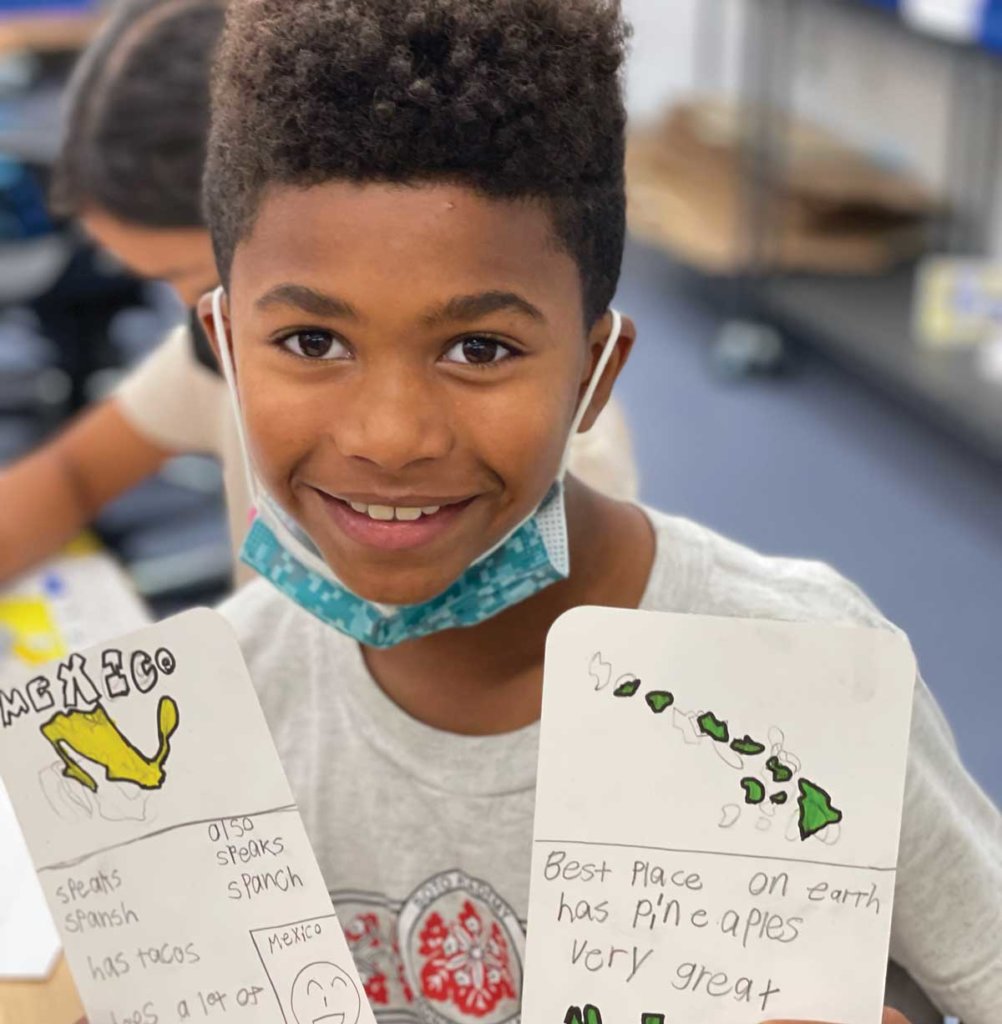By Noëlle Nakaoka ’20
This fall, the Case Accelerator for Student Entrepreneurship (CASE) broadened its reach to Junior School students, launching two inaugural courses – Art of Entrepreneurship, and Game Academy – through Punahou’s Extended Learning program.
There is incredible value in fostering an entrepreneurial mindset among students of all ages. But what does it mean when this learning approach is taught to bright and curious fourth and fifth graders?
“In this world of accelerating change, you need to be able to think on your feet, pitch an idea, persuade people to your vision, connect with those you’re aiming to serve, and make sure that you have a solution that really works for them,” says Mark Loughridge, director of CASE. “The sooner you can start on that, the more confidence and skill you have for succeeding in whatever you want to do.”
The focus of these courses is not to teach just subject matter, but to integrate real-world examples that promote positive change. Entrepreneurship at Punahou focuses on the triple bottom line: people, profit and planet, Loughridge explains. The students are not only learning to launch their own creative technology companies – but they are also being taught to ideate and execute for the greater good of the community.
Art of Entrepreneurship
With two full sections of 24 students each, plus a long wait list, the Art of Entrepreneurship is in high demand. This course focuses on product-based education and teaches students to create original products and services with sustainability themes. What started as an Academy Explorations class has been exported to a Junior School level course taught by Matthew Lorin, an expert in education and education reform. Instead of listening to lectures, students engage in hands-on learning where they go from conceptualizing to materializing a product every week for a semester. These immersive design sprints include everything from creating a chocolate brand, innovating with laser cut wood, and creating aromas to incorporate into everything from soap to sunscreens to lip balms.
A class favorite is the bubble tea design sprint, where students brew bubble teas, design flavors, and select colors, original logos and catchy names for their brands to raise awareness for the endangered animal species they are championing. Another is a workshop in partnership with the Plastic4Purpose Academy club, where students turn plastic trash into beautiful jewelry wrapped with metal wire or embedded in resin.
Art of Entrepreneurship also focuses on design thinking and the importance of iterating to success. While some students may not completely finish a project, they are encouraged to produce a minimum viable product and incorporate their classmates’ feedback in future renditions.
“Iterating to success, essentially learning from our mistakes, is an essential life skill. Without it, we shy away from trying new things,” says Lorin. “The younger we accept this as part of life’s learning journey, the sooner we let go of the anchors of pride.”
Game Academy
Game Academy is not your typical coding course. As part of Punahou’s extended learning program, fourth graders are working day-to-day on challenges within the Scratch platform – which is a block-based visual programming language where they learn to build components of a game. Throughout the semester, students are practicing these skills to create their own games, with each student making three to four games a semester. While students learn game design and coding, there are many other skills involved in this process.
“This experiential class develops fundamental creative and entrepreneurial skills, preparing our students for careers that may not exist today,” says Yolanda Lau ’98, instructor of the course and an experienced entrepreneurship consultant. “Students create original games that integrate their understanding of our interactive math, science, and arts lessons. The skills learned – brainstorming, programming, computational thinking, art and animation, project management, design thinking, resiliency, and teamwork – are lifelong 21st century skills. Ultimately the goal is not to create coders but to mold young entrepreneurs, ready to tackle any challenge.”
It’s one thing to play a game – but it’s another thing entirely to experiment with the code of a game and see how the final product changes with each small modification, Lau explains. From figuring out how you use shape and color and line in a background to engage players, to creating an appealing character, to incorporating loops, a point system, timers and multiple levels, students have to think from the entrepreneurial perspective and ask themselves questions such as: “What is my company’s mission? How does it find its audience? How do I cater to it?”


What’s in Store
As Junior School students explore these offerings in entrepreneurship and coding, a substantial amount want to dive deeper into their projects. CASE supports these students in taking their passions to the next level, whether it is at the Junior and Middle School level or at the Academy level, as part of the new Centers Distinctions Program that recognizes students who are deeply invested in the CASE mission.
Looking to the future, Loughridge hopes to expand these engaging and hands-on workshops to benefit the wider community.
